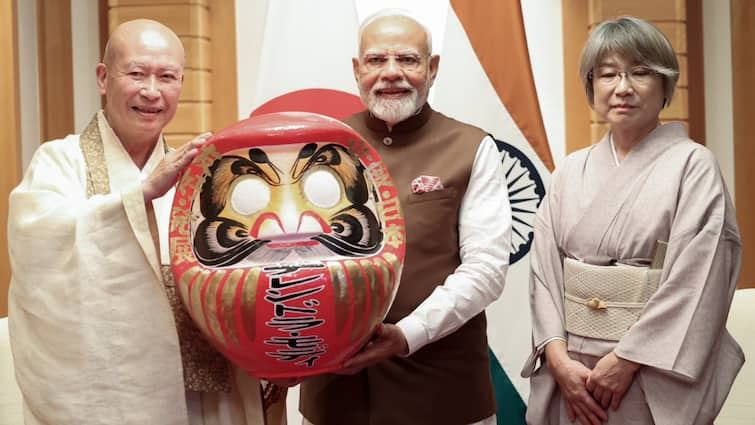Prime Minister Narendra Modi’s two-day visit to Japan began on a symbolic note when Rev. Seishi Hirose, the chief priest of Shorinzan Daruma-Ji Temple in Tokyo, presented him with a Daruma doll. The traditional gift, rooted deeply in Japanese culture, represents perseverance, good luck, and the spirit of resilience.
VIDEO | Tokyo: PM Narendra Modi (@narendramodi) is presented with a Daruma doll by the priest at Shorinzan Daruma-ji Temple.
The Daruma doll is a traditional Japanese talisman symbolizing perseverance and good luck, often used to set and achieve personal or professional goals.… pic.twitter.com/zfjlPtnAdu
— Press Trust of India (@PTI_News) August 29, 2025
ALSO READ: ‘India Ready To Advance Bilateral Ties’: PM Modi Ahead Of Meeting With China’s Xi Jinping
What Is A Daruma Doll?
The Daruma is one of Japan’s most recognisable cultural icons. Modelled after Bodhidharma, the Indian monk credited with founding Zen Buddhism, the hollow, round dolls are usually painted red and bear stern expressions. Beyond their striking appearance, Daruma dolls are seen as talismans of fortune and determination.
The Japanese tradition involves painting one eye of the doll when setting a personal goal. The second eye is filled in only when the goal is achieved, turning the doll into a constant reminder of perseverance and the saying, “Fall down seven times, stand up eight.”
A Cultural Link To India
Interestingly, the Daruma has a strong connection to India. It is inspired by Bodhidharma, a monk from Kanchipuram, who meditated for nine years facing a wall. His intense practice is said to have caused his limbs to atrophy, a story reflected in the doll’s limbless design. This unique cultural exchange continues to symbolise the shared heritage between India and Japan.
Modi Meets Former Japanese Prime Ministers
Alongside the ceremonial exchange, Modi also met former Japanese prime ministers Yoshihide Suga and Fumio Kishida. With Suga, discussions centred on strengthening India-Japan ties across technology, artificial intelligence, trade, and investment. Kishida, a long-time supporter of closer bilateral ties, engaged in conversations about critical technologies, semiconductors, and human resource mobility.
During his Tokyo engagements, Modi addressed the India-Japan Economic Forum, emphasising opportunities in manufacturing, green energy, innovation, and skill development. Echoing Japanese Prime Minister Shigeru Ishiba’s remarks, he highlighted how “Japan’s excellence and India’s scale can create a perfect partnership,” adding that the two nations together could shape the Asian century.



